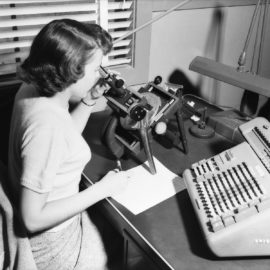

This article is an excerpt from the Shortform summary of "The Smartest Guys in the Room" by Bethany McLean and Peter Elkind. Shortform has the world's best summaries of books you should be reading.
Like this article? Sign up for a free trial here .
Who is Jeff Skilling of Enron? What was his role in the company’s failure?
Jeff Skilling, Enron’s COO was instrumental in enacting the business practices and culture that led to Enron’s demise. Jeff Skilling at Enron promoted bad accounting practices, greed, and more.
The Rise of Jeff Skilling at Enron
With the power vacuum, Skilling (head of Enron’s trading operations) maneuvered into the COO role, basically by threatening to quit if he didn’t get it. Jeff Skilling’s Enron strategy included a number of changes:
1) The focus shifted to trading as the core of Enron’s business. Physical assets that actually dealt with supplying energy were sold off.
- EOG (Enron Oil and Gas) was spun off. It still survives today as a public company, EOG Resources.
2) Enron’s trading scope expanded outside natural gas. Their aim was to become “The World’s Leading Energy Company.” They expanded into electricity, and they engaged in plant deals from gas plants to water, steel, and paper. The promise was huge – if Enron could create an electricity-trading business and claim 20% of it, the payoff would be enormous.
- But they overextended, believing the markets were more similar to gas than they really were. For example, as an outsider to electricity, Enron was feared as the big player that incumbents shouldn’t partner with.
3) Enron International head Rebecca Mark was sidelined and knew she wouldn’t rise further in management. She decided to buy a British water utility, forming the company Azurix. (This would later end in failure, described in a later chapter.)
4) Skilling set up a Risk Assessment and Control (RAC) department, which publicly was believed to be watertight and having strong veto power over risky deals. Stock analysts believed Enron had tight risk management capabilities, which gave Enron the leeway to take on more risk than other companies.
- In reality, RAC was just a yesman, with a weak manager in place who didn’t fight against bad deals.
- RAC staff also faced strong pressure to close deals to hit quarterly numbers. Enron’s staff had a peer review system that was a key component of promotions and compensation. Deal originators within Enron threatened poor peer reviews for RAC peers who didn’t approve deals.
Wall Street Expectations
Jeff Skilling at Enron promised Wall Street 15% growth a year. This obsession with meeting earnings targets powered the deception that was later to come.
In 1997, Enron made $105MM, a 82% drop from 1996.
- Gas trading had become more competitive. Banks were making loans, and buyers were loath to sign long-term origination deals.
- Some earlier deals had turned out unwise and missed projections, requiring writedowns.
In this environment, where Jeff Skilling and Enron made aggressive promises to investors, but had shakey core operations, it couldn’t resist the temptation to conduct fraud to meet numbers.
Jeff Skilling and Enron’s Legacy
As the largest bankruptcy in US history to that point, the public demanded heads. And there were many responsible parties to punish.
The clearly illegal smoking guns led to straightforward convictions – Fastow’s misrepresentations about LJM; asset sales that were booked as revenue but in reality had a guarantee to be rebought, which meant it was a loan.
Arthur Andersen, previously one of the big five accounting firms, was convicted of obstruction of justice in 2002 for shredding documents. It voluntarily surrendered its licenses to practice as CPAs in 2002.
- (The Supreme Court later reversed the conviction in 2005, though by that point its besmirched reputation prevented it from gaining any clients.)
The banks agreed to write big settlement checks, ultimately producing $7.2 billion for shareholders (about 20 cents for each dollar lost).
Beyond these, the legal difficulty was that most of the financial maneuvers were not technically illegal (which is why Fastow so brazenly boasted about the structures, and Wall Street praised them).
There also was no smoking gun that indicated either Lay or Skilling knew the extent of risk taken and predicted Enron’s demise. On deal forms, many signature lines for Skilling were left blank. They blamed Arthur Andersen and their lawyers for not detecting problems.
- For years, Lay and Skilling maintained that what they did was no different from the overoptimistic projections by dotcom companies. Instead, they had always been targeted unfairly by short sellers.
Ultimately, prosecutors chose a simpler, broader strategy – rather than analyze specific transactions and prove their illegality, they asserted that Enron had severely misrepresented Enron’s financial health, manipulating public earnings through devices designed to produce misleading results and failing to disclose facts about Enron’s dire position.
- Examples of things that should have been disclosed – EES losses being hidden in wholesale; writedowns in bad deals like Azurix; meltdown in SPEs like the Raptors; last-minute filling holes to make quarterly financials look better.
- Furthermore, accounting rules barred a company from using its stock to boost its income statement.
- Other things that looked bad in trial – their cashing out of lots of personal shares; extravagant lifestyles; legal settlements with many Enron employees (if nothing was wrong, why had they all settled?)
In May 2006, the jury found Skilling and Lay guilty. Lay died in July from a heart attack (some suspected he faked his death). Jeff Skilling’s Enron days were over, and he was sentenced to 24 years in prison and a fine of $45 million.
The massive failure of Enron also spurred regulatory changes:
- Sarbanes-Oxley increased the personal liability of CEOs for financial statements; instituted requirements for auditor independence; and increased penalties for securities fraud.
- The Credit Rating Agency Reform Act aimed to reduce lack of competition between the big three agencies. (This didn’t kick in strongly enough in time to prevent the subprime mortgage crisis in 2008.)
Jeff Skilling of Enron was convicted for his role in the company’s fraud. Jeff Skilling’s Enron days would always be known as the end of the company and a time of turmoil.

———End of Preview———
Like what you just read? Read the rest of the world's best summary of Bethany McLean and Peter Elkind's "The Smartest Guys in the Room" at Shortform .
Here's what you'll find in our full The Smartest Guys in the Room summary :
- How Enron rose to become one of the world's most promising companies
- How Enron management's greed led it to start cutting corners
- The critical failures that crashed Enron's house of cards to the ground






